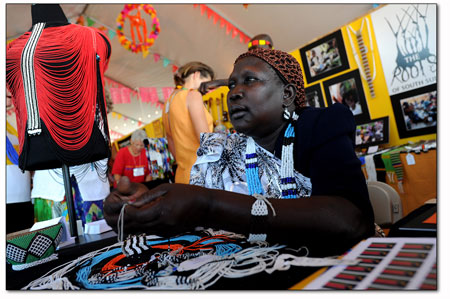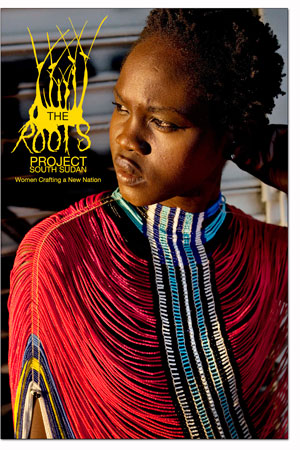 |
| Roots Project artisan Mary Padar sells her beaded works, including one of her intricate corsets, during the UNESCO Folk Art Fair in Santa Fe this summer. Padar, a former member of the Sudan People’s Liberation Army, joined the Roots Project in 2010, trading in her camo for beading and a chance to be closer to her kids and grandkids./Courtesy Photo |
Setting down roots
Roots Project aims to empower South Sudanese women
by Missy Votel
The Republic of South Sudan may only be a few years old, but its roots stretch all the way to Durango.
This Thur., Nov. 21, handmade jewelry from the newly formed East African nation will be available for perusing or purchase at a special one-time event at the Lost Dog, from 4 - 7 p.m. The jewelry show and sale is part of the Roots Project, a nonprofit organization dedicated to empowering women from the fledgling nation while helping to preserve its culture and fostering intertribal unity. All proceeds from the sale of the jewelry go directly to the 60 women who create the beaded works of art from a workshop in Juba, the capital city of the Republic of South Sudan (ROSS.)
"That's what' so great about the project is that everything goes directly to the women to support themselves in South Sudan," organizer of Durango's Roots event, Tina Miely, said.
Just the FactsWhat: The Roots Project, jewelry sale and show benefiting South Sudanese women
When: 4 - 7 p.m., Thurs., Nov. 21
Where: The Lost Dog Bar and Lounge, 1150 Main Ave.
More info: www.rootsofsouthsudan.org
|
Tonight's event will feature four trunkloads of items, from beaded earrings, bracelets and necklaces to intricate corsets, traditionally worn by the country's elite. And while the corset is more of a "museum piece" worthy of its $1,200 price tag, Miely said the majority of items will be priced reasonably between $20 to $40. The evening will also include free beer and wine as well as a slide presentation on the project, which began in 2011.
"We'd like to raise as much as we can," said Miely.
A local real estate agent, Miely became involved with the Roots project though a childhood friend who worked as a photographer with the U.N. During his travels, he met and later married Anyieth D’Awol, who is South Sudanese and founder of the Roots Project.
A civil rights lawyer, activist and author who lived abroad, D'Awol returned to her native country in 2006-07 and again in 2009 as a human rights officer for the United Nations Mission in Sudan. She said she was called to action when she kept seeing the same women over and over again on her caseload. “We were doing so-called capacity building, but we kept seeing the same people,” she said. “I thought, 'why don’t we do something practical, teach people to take care of themselves?'”
South Sudan by the numbersThe newest member of the international community, the Republic of South Sudan (previously known as Southern Sudan) officially became a country when it voted to secede from Sudan on July 9, 2011. A landlocked country in East-central Africa, it is bordered by Ethiopia to the east, Kenya to the southeast, Uganda to the south, the Democratic Republic of the Congo to the southwest, Central African Republic to the west; and the Republic of Sudan to the north. Home to an estimated 10 million people, it includes the vast swamp region of the Sudd, formed by the White Nile and known locally as the Bahr al Jabal. Formerly under Egyptian control, Sudan became an independent country in 1956. However, independence was soon followed by decades of civil war, which ended with a peace agreement in 2005. Later that year, southern autonomy was declared and an autonomous government of Southern Sudan was formed. However, decades of war has taken a serious toll on the country's infrastructure and resulted in widespread destruction and displacement of its people. It is estimated that more than 2.5 million were killed and millions more became refugees during the wars. Although roughly the size of Texas, South Sudan has only about 60 miles of paved roads and more than 1 million children have no access to basic education and about 93 percent of citizens don't have access to proper sanitation. In 2010, the UN World Food Program fed 4 million South Sudanese, one half of the total population. Although often confused with its war-torn neighbor Darfur (collectively made up of three states: Northern Darfur, Western Darfur and Southern Darfur) these states actually form the western border of the country of Sudan, to the north. – Missy Votel Source: www.rootsofsouthsudan.org |
In 2009 she founded the Roots Project, which gained nonprofit status in the United States in March 2011, with the aim of providing a place for women to pursue economic independence. She also saw it as a bridge to understanding between tribal factions – 19 different tribes are represented at Roots –many of which have historically been at war with one another. But now, instead of fighting, they spend their days sharing stories, tips and support.
Perhaps most of all, though, the Roots Project offers dignity in a country where women are undervalued and basic education, human rights and health services for them are severely lacking. According to the Roots Project, literacy for women in South Sudan hovers around 12 percent (as opposed to 24 percent for men); one out of seven women will die from complications of pregnancy; and a 15-year-old girl has a higher chance of dying in childbirth than completing high school.
“The women of southern Sudan are ‘the marginalized of the marginalized,’” D’Awol said, quoting John Garang, the late South Sudan rebel leader who saw many of the problems in Sudan stemming from the Khartoum regime. "They are not empowered, they don't have money, they don't have the ability to control what goes on around them... they needed to be given the opportunity to become more self-sufficient."
In addition to offering women a job, the Roots Project also offers lessons in reading, writing and math; equipment, learning materials and job training; meals; and health education and examinations. And, perhaps most importantly, it does so in a safe environment for mothers and their children.
 Although D'Awol is Southern Sudanese, she spent much of her time growing up in Norway, Tanzania, China and England, where she attended college. Now a U.S. citizen, she first visited South Sudan when she was 27, and splits her time between Brooklyn and Juba. “I never thought I would stay in England. I always knew I wanted to come back to Sudan,” she said.
Although D'Awol is Southern Sudanese, she spent much of her time growing up in Norway, Tanzania, China and England, where she attended college. Now a U.S. citizen, she first visited South Sudan when she was 27, and splits her time between Brooklyn and Juba. “I never thought I would stay in England. I always knew I wanted to come back to Sudan,” she said.
In addition to her world travels, D'Awol has also been to Durango, paying a visit to Miely and her husband, Tony, this summer. Although D'Awol will not be in attendance at the Durango show, Miely said she is hoping for an enthusiastic turnout nonetheless. She was persuaded to try a show here after seeing family friends (D'Awol's in-laws) host one in Seattle this summer.
"When they asked it I would do one here, I said 'absolutely!'" said Miely. "I think our community would really rally around it. People in Durango have such a pull to do good for other people."
In addition to shows in Seattle, New York City and Phoenix, Roots Project jewelry was also featured in 2012 and 2013 at the UNESCO Folk Arts Festival in Santa Fe.
For Miely, D'Awol and the 60 female artists at Roots, they are hoping this is only the beginning of a bright new future for themselves, and their country. But in the meantime, the women would just like to see the thatch roof on their new workshop, which recently collapsed, repaired.
"Who knows?" said Miely. "Durango could end up being the biggest sale they have, which could benefit the women immensely. The money's not just going to some unknown entity. It's really neat to see direct results."
For more information, go to: www.rootsofsouthsudan.org
There is currently no content available.
